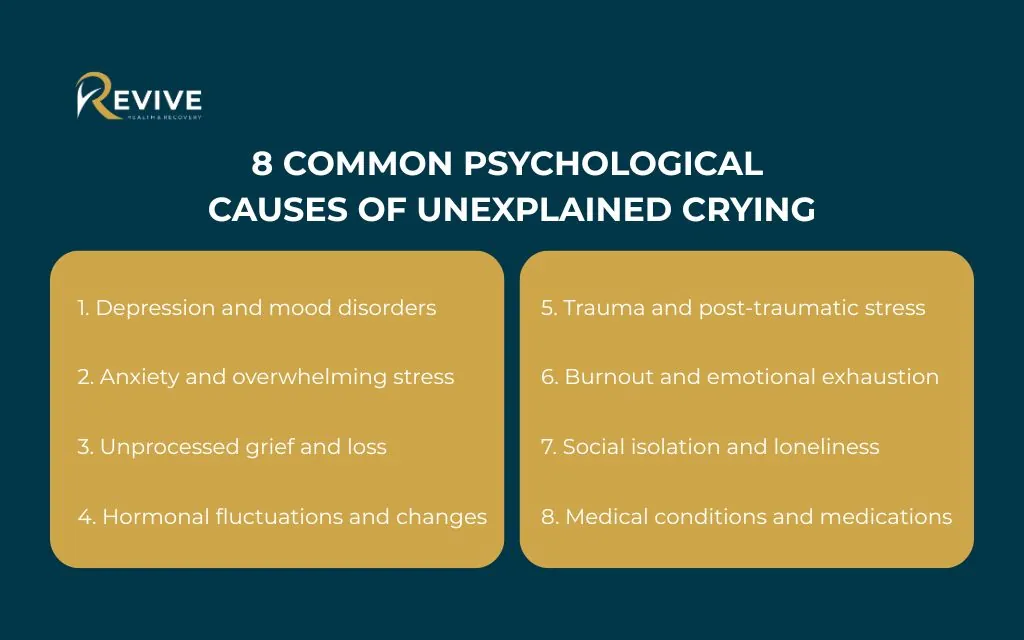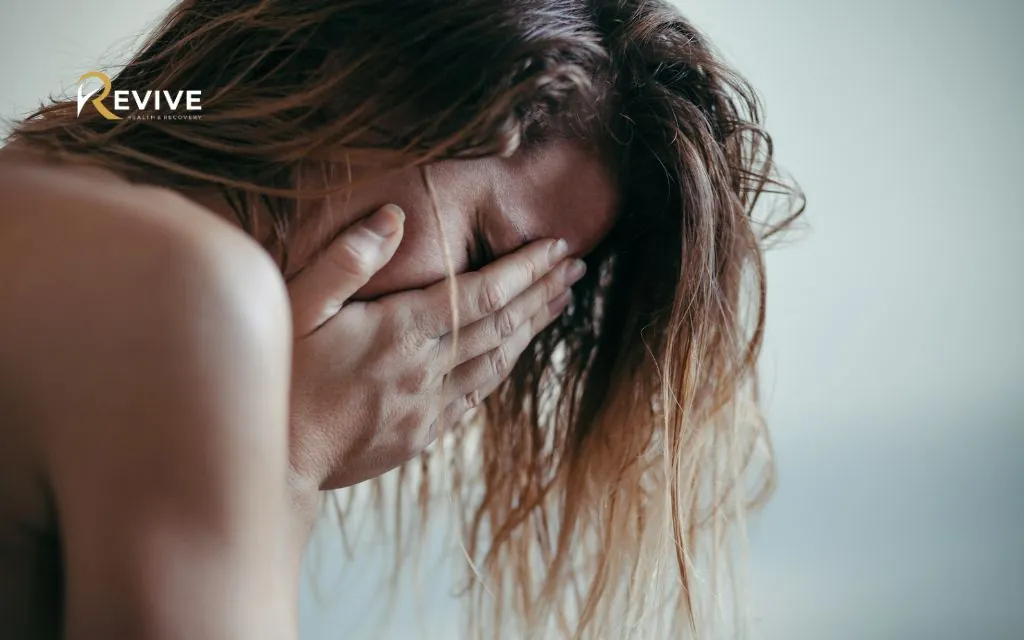Have you ever found yourself suddenly tearing up without understanding why and asking yourself ‘why do I randomly feel like crying”? If so, you’re not alone. Random crying episodes affect millions of people and often signal that your emotional system is processing something important.
While it may feel concerning or embarrassing, these moments are typically your mind’s way of releasing built-up stress, processing hidden emotions, or responding to underlying mental health conditions. From hormonal fluctuations to depression symptoms, there are numerous scientific explanations for why tears appear seemingly out of nowhere.
Understanding these causes is the first step toward better emotional health and finding effective coping strategies. In this comprehensive guide, we’ll explore the psychology behind random crying, identify common triggers, and provide evidence-based solutions to help you manage these episodes while supporting your overall mental wellness.
The science behind random crying episodes
How your brain processes emotions
Your brain operates like a complex emotional computer, constantly processing feelings and memories. The amygdala, your brain’s emotional center, stores emotional memories that can trigger crying responses to seemingly unrelated situations. This explains why certain smells, sounds, or environments might suddenly make you feel like crying for no reason.
Neurotransmitter imbalances play a crucial role in emotional regulation. When serotonin, dopamine, or other brain chemicals become unbalanced, you might experience crying spells or sudden urges to cry. These chemical shifts can happen due to stress, lack of sleep, or underlying mental health conditions.
Your stress-response system also influences emotional reactions. When cortisol levels spike from chronic stress, your emotional regulation becomes compromised, leading to unexpected crying episodes or feeling overwhelmed by everyday situations.
Why tears come “out of nowhere”

Your brain processes emotions on multiple levels, including subconscious recognition of triggers. Sometimes you start crying before you consciously understand why. This delayed emotional processing means your mind might be working through feelings from hours, days, or even weeks ago.
The body’s pressure-release response functions like a safety valve. When emotional pressure builds up, crying serves as a natural release mechanism. This is why you might randomly cry after particularly stressful periods, even when you think you’re handling everything well.
8 common psychological causes of unexplained crying
If you’re experiencing random crying episodes in Colorado, you’re not alone. Here are the 8 most common psychological reasons why tears appear “out of nowhere” and what you can do about them:
1. Depression and mood disorders
- What it looks like: You cry for no apparent reason, especially when feeling persistently sad, exhausted, or uninterested in things you used to enjoy.
- Why it happens: Major depressive disorder disrupts your brain’s emotional regulation system, making tears more likely even during routine activities.
- Colorado connection: Seasonal affective disorder hits many Colorado residents hard during our long, dark winters. The combination of reduced sunlight and harsh weather creates the perfect storm for depression-related crying episodes.
- Red flags to watch for: Daily crying lasting more than two weeks, combined with sleep changes or loss of appetite.
2. Anxiety and overwhelming stress
- What it looks like: Sudden crying during panic attacks, or tears that come when stress feels too much to handle.
- Why it happens: Your nervous system stays in constant “fight or flight” mode, and crying becomes your body’s pressure release valve.
- Denver-specific triggers: Our fast-paced urban lifestyle, traffic congestion, and rising cost of living create unique stressors that can overwhelm anyone’s emotional reserves.
- When to be concerned: If crying episodes interfere with work, relationships, or daily activities.
3. Unprocessed grief and loss
- What it looks like: Unexpected tears triggered by a song, smell, or location that reminds you of someone or something you’ve lost.
- Why it happens: Your brain processes grief on its own timeline, not yours. Emotions can surface months or even years after a loss.
- Common triggers: Anniversaries, holidays, or major life changes that remind you of what’s missing.
- Important note: Grief has no expiration date, and professional support can help you navigate this difficult journey.
4. Hormonal fluctuations and changes
- What it looks like: Crying episodes that seem to follow your menstrual cycle, during pregnancy, or around menopause.
- Why it happens: Estrogen and progesterone directly affect neurotransmitters in your brain that control emotions.
- Who’s affected most: Women experiencing PMS, PMDD, pregnancy, postpartum period, or menopause transitions.
- Relief is available: Hormonal crying is treatable through therapy, lifestyle changes, and sometimes medical intervention.

5. Trauma and post-traumatic stress
- What it looks like: Sudden emotional reactions that feel disproportionate to the current situation.
- Why it happens: Past traumatic experiences create invisible emotional triggers. Your brain may react to perceived threats even when you’re actually safe.
- Types of trauma: Childhood experiences, accidents, violence, or any event that overwhelmed your ability to cope.
- Hope for healing: Trauma-informed therapy can help you process these experiences and reduce unexpected emotional reactions.
6. Burnout and emotional exhaustion
- What it looks like: Crying when faced with simple decisions or minor stressors that normally wouldn’t bother you.
- Why it happens: Your emotional resources are completely depleted, like a phone battery that’s drained to zero.
- Common in Colorado: High-stress careers, caring for aging parents, or managing multiple responsibilities without adequate support.
- Recovery path: Professional burnout treatment focuses on rebuilding your emotional reserves and creating sustainable life balance.
7. Social isolation and loneliness
- What it looks like: Increased crying when you’re alone, or emotional reactions during social interactions after periods of isolation.
- Why it happens: Humans are wired for connection. When that’s missing, your emotional regulation system becomes more sensitive.
- Colorado challenges: Our outdoor culture can sometimes make people feel excluded if they can’t participate in hiking, skiing, or other activities.
- Solution focus: Building meaningful connections through therapy, support groups, or community activities.
8. Medical conditions and medications
- What it looks like: Crying episodes that started after beginning new medications or alongside other physical symptoms.
- Why it happens: Thyroid disorders, neurological conditions, or medication side effects can directly affect your brain’s emotional centers.
- Conditions to consider: Hypothyroidism, hyperthyroidism, autoimmune disorders, or brain injuries.
- Next steps: Work with both your medical doctor and mental health professional to address all aspects of your health.
Physical and neurological factors
Fatigue and sleep deprivation effects
Sleep plays a critical role in emotional regulation. When you’re sleep-deprived, your brain struggles to process emotions effectively, leading to increased crying and emotional sensitivity.
Chronic exhaustion creates mood instability that can manifest as random crying episodes. Your emotional reserves become depleted, making you more vulnerable to crying triggers.
Denver’s high altitude can affect sleep quality for some residents. The reduced oxygen levels and atmospheric pressure changes may contribute to sleep disturbances that impact emotional regulation.
Medical conditions that cause crying
Pseudobulbar affect is a neurological condition causing involuntary crying episodes. This condition affects people with brain injuries, multiple sclerosis, or other neurological disorders, causing crying that doesn’t match their actual emotions.
Traumatic brain injury can alter emotional processing, leading to unexpected crying spells. Even mild concussions can affect the brain’s emotional regulation centers.
Certain medications, including some antidepressants, blood pressure medications, and hormonal treatments, can cause emotional side effects including increased crying episodes.
Environmental and lifestyle triggers
Colorado-specific factors
High altitude affects some people’s mood and emotional regulation. The changes in atmospheric pressure and oxygen levels can contribute to emotional sensitivity and crying spells.
Seasonal weather patterns in Colorado create unique stressors. The dramatic temperature changes, sudden storms, and intense sun exposure can impact mental health and emotional stability.
Urban stress in the Denver metropolitan area includes traffic congestion, cost of living pressures, and fast-paced lifestyle demands that can contribute to emotional overwhelm and random crying.
Social and relationship stressors
Isolation and loneliness significantly impact emotional health. When you lack strong social connections, minor stressors can trigger disproportionate emotional responses, including sudden crying.
Workplace burnout creates chronic stress that often manifests as crying episodes. The combination of job pressure, long hours, and lack of work-life balance can overwhelm your emotional coping mechanisms.
Family dynamic pressures, including caregiving responsibilities, relationship conflicts, or major life transitions, can create emotional stress that surfaces as random crying episodes.
When random crying signals depression
Recognizing depression warning signs
Persistent sadness that lasts more than two weeks, especially when combined with random crying, often indicates depression. This sadness feels different from normal grief or disappointment.
Loss of interest in activities you once enjoyed, combined with frequent crying spells, suggests possible depression. This symptom, called anhedonia, is a key indicator of major depressive disorder.
Changes in sleep and appetite patterns alongside crying episodes require attention. Depression often disrupts basic biological functions while increasing emotional sensitivity.
The connection between crying and mental health
Emotional dysregulation in depression affects your ability to manage feelings appropriately. Normal emotional responses become amplified, leading to crying that feels excessive or inappropriate.
Crying frequency can serve as a diagnostic indicator for mental health professionals. Tracking when and how often you cry helps identify patterns related to depression or other conditions.

Depression affects tear production and emotional expression. Some people with depression cry more frequently, while others find they can’t cry even when they want to, creating emotional numbness.
Effective coping strategies and solutions
Immediate response techniques
Mindfulness and grounding exercises help when you feel like crying without knowing why. Focus on your breathing, name five things you can see, and four things you can touch to reconnect with the present moment.
Breathing techniques for emotional regulation include the 4-7-8 method: breathe in for 4 counts, hold for 7, and exhale for 8. This activates your parasympathetic nervous system and reduces emotional intensity.
Self-soothing methods like gentle self-talk, warm baths, or listening to calming music can help manage sudden crying episodes. These techniques work by activating your body’s relaxation response.
Long-term management approaches
Cognitive behavioral therapy helps identify thought patterns that contribute to emotional overwhelm. Learning to recognize and challenge negative thinking reduces the frequency of crying episodes.
Lifestyle modifications for emotional stability include regular exercise, consistent sleep schedules, and stress management practices. These changes strengthen your emotional resilience over time.
Building emotional resilience skills through therapy and practice helps you better manage intense emotions. This includes learning to tolerate distress and developing healthy coping mechanisms.
Professional treatment options
When to seek mental health support
Red flag symptoms requiring immediate intervention include daily crying for more than two weeks, crying that interferes with work or relationships, or crying accompanied by thoughts of self-harm.
Frequency and duration guidelines suggest seeking help if crying episodes occur multiple times per week or last longer than expected for the triggering situation.
Impact on daily functioning assessment helps determine when professional support is needed. If random crying prevents you from completing normal activities, it’s time to seek help.
Types of therapy for emotional regulation
Individual counseling approaches like cognitive behavioral therapy and dialectical behavior therapy specifically address emotional regulation difficulties and crying episodes.
Group therapy benefits include connecting with others who experience similar challenges. Sharing experiences and coping strategies in a supportive environment accelerates healing.
Medication considerations may include antidepressants or anti-anxiety medications to address underlying chemical imbalances contributing to emotional dysregulation and frequent crying.
Building emotional wellness in daily life
Creating healthy emotional habits
Daily mindfulness practices, even just five minutes of meditation, strengthen your emotional regulation skills. Regular mindfulness reduces the intensity and frequency of random crying episodes.
Stress management techniques like progressive muscle relaxation, journaling, or creative activities help process emotions before they build up to overwhelming levels.
Social support network development protects against isolation and provides outlets for emotional expression. Strong relationships offer both practical support and emotional validation.
Preventing emotional overwhelm
Early warning sign recognition helps you identify when stress is building before it leads to crying episodes. Common signs include irritability, fatigue, or feeling “on edge.”
Proactive mental health maintenance includes regular self-care activities, consistent sleep schedules, and stress monitoring. Prevention is more effective than crisis management.
Work-life balance strategies protect your emotional reserves. Setting boundaries, taking breaks, and prioritizing self-care prevent emotional burnout that leads to crying spells.
FAQs about feeling ‘why do i randomly feel like crying’
Is it normal to cry every day?
Daily crying can indicate depression or overwhelming stress and typically warrants professional evaluation, especially if it persists for more than two weeks. At Revive Health Recovery, our experienced therapists help identify underlying causes and develop effective treatment plans for emotional regulation.
Why do I cry more at night?
Evening hours often provide the first quiet moments for suppressed emotions to surface, making nighttime crying particularly common during stressful periods. This natural emotional processing is normal, but if it disrupts sleep regularly, professional support can help.
Can hormones really make me cry for no reason?
Yes, hormonal fluctuations during menstruation, pregnancy, or menopause can significantly affect emotional regulation and trigger unexpected crying episodes. Our specialists at Revive Health Recovery understand these connections and provide comprehensive treatment approaches.
How do I know if my crying is depression or just stress?
Depression-related crying typically occurs alongside other symptoms like persistent sadness, fatigue, and loss of interest, while stress-related crying often has identifiable triggers. Revive Health Recovery’s assessment process helps distinguish between these conditions and creates appropriate treatment plans.
What should I do when I feel like crying in public?
Practice deep breathing, excuse yourself if possible, and remember that emotional responses are normal. Seeking professional support can help develop better coping strategies for managing emotions in all situations.
Why choose Revive Health Recovery for your mental health journey
- Personalized treatment plans: Our expert team creates individualized therapy approaches tailored to your specific emotional needs and circumstances. We understand that random crying episodes have unique causes for each person.
- Comprehensive mental health services: From depression counseling to anxiety management, we offer complete outpatient mental health support without the hospital setting. Our services address all aspects of emotional wellness.
- Experienced Colorado specialists: Our licensed therapists understand the unique challenges of living in Colorado, including altitude effects and seasonal mood changes that can contribute to emotional dysregulation.
- Flexible scheduling options: With 24/7 availability and convenient Denver location, we make mental health care accessible when you need it most. Crisis support is always available for urgent emotional needs.
- Evidence-based treatment methods: We use proven therapeutic techniques like CBT and mindfulness training to help you develop lasting emotional regulation skills and reduce crying episodes.
Don’t struggle alone with unexplained crying
Random crying episodes don’t have to control your life. Understanding the psychological and physiological causes behind these emotional responses is the first step toward healing and developing healthier coping mechanisms. Whether you’re experiencing stress-related tears, depression symptoms, or hormonal fluctuations, professional support can make a significant difference in your emotional well-being.
Experiencing random crying episodes is more common than you think, and help is available right here in Colorado. At Revive Health Recovery, our experienced therapists understand the unique challenges of living in our state and provide personalized treatment for all types of emotional difficulties.
Don’t wait for your emotional struggles to worsen. Contact us today at (303) 268-4655. We’re available 24/7 to provide support when you need it most. You can also reach out via email at contact@revivehealthrecovery.com to learn more about our personalized treatment options.
Your mental health matters, and seeking help is a sign of strength, not weakness. Let Revive Health Recovery guide you toward emotional wellness and a brighter, more balanced future.



